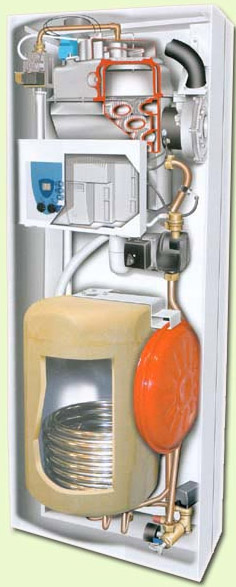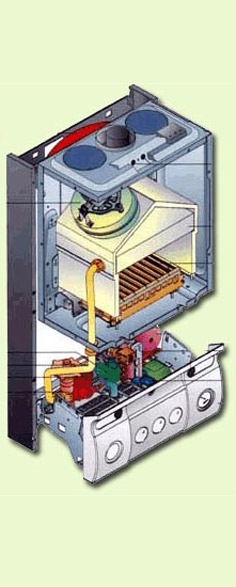Eco quality
Solar panels since 1985 for self-sufficiency in our production of warm water for the entire residence.
Central heating based on a condensing boiler, and thereby limiting our CO2 emissions by saving 30% of gas.
Photovoltaic panels producing about 3KWh of electrical energy
Energy saving lamps used for about 95% of our lighting requirement
Water system with flow limiters that allow for water savings of about 50% on each tap it is applied to
Water softeners make the water less hard which allows for lower use of detergents
Waste sorting system separating paper, glass, plastic, batteries etc.
Solar panels
Our Solahart solar panels cover an area of 26 square meters, with a capacity of heating 2700 litres per day water in summertime.
The cost of such a plant is about € 20.000,- to 22.000,- including the purchase and installation.
The time it takes for the implementation of such a system to be completed is relatively short, here in Italy it requires only to be approved by the local city town hall after having conducted a presentation for its board members.
After 20 days of the request for submission you can start the installation if it has been approved.
Warning: without the presentation to the city town hall, you are not edible to receive the deduction of 55% on the total installation costs.
Hurry to install them: each year, a family can save up to 800/1000 Euro!



Central heating based on a condensing boiler
These are boilers that operate in a sustainable way by recovering a part of the generated heat. Normally, the heat of the gasses that are dispersed in the exhaust, have a temperature of about 110 degrees, and hold a lot of condensed water.
For a better exploitation of the burned gas, better performance and therefore reduced consumption trough optimised efficiency, our boilers are equipped with a system that makes use of these high temperatures of the exhaust gasses.
The exhaust gasses, before being emitted into the atmosphere, are forced through a heat exchanger where the water vapour condenses, thereby exchanging a large part of the heat of these gasses.
The result is that the exhaust gases emitted have a much lower temperature of 40 degrees, and therefore recover heat would otherwise have been lost.
In general, these systems can recover about 16-17% (each boiler is unique) of energy that would otherwise have been lost.
The maximum efficiency of this system can be obtained with systems operating at low temperatures (such as floor heating, radiant panels), in this case the energy savings can increase up to about 30%.


Photovoltaic panels
We have installed 16 modules producing 220w each, for a total power peak output of 3520watt, covering an area of about 25 square meters.
The energy production per year is about 4550Kw/h.
The total cost including installation (which depends on whether they are placed on a roof or in a garden) maintained by us was € 25.000,-
Like is the case for the solar panels producing warm water, also for this installation it is required to be presented to the local city town hall in order to make use of tax benefits.
The time of installation of the photovoltaic panels are equal to the solar panels.



LED Lighting
We use LED lamps for 95% of our lighting requirements.
The light-emitting diode (LED) is one of today’s most energy-efficient and rapidly developing lighting technologies.
Quality LED light bulbs last longer, are more durable, and offer comparable or better light quality than other types of lighting.
Most importantly, LED lamps generally consume about 75% to 95% less energy than conventional halogen lighting solutions and last about 25 times longer, therefore significantly contributing to the environment.
Water system with flow reducers
The flow reducers in our water systems are applied to all units in the water system, apart from the washing machines, dishwasher and toilets.
The flow reducers increase the amount of air in the air to water ratio of which the total water flow is made up, thereby exploiting the pressure that consequently allows for equal utility and lower water consumption.
The reduction of water consumption is estimated at around 30% approximately.
Water softeners
The presence of certain metal ions in water causes a variety of problems, such as interference with the action of soaps.
They also lead to build-up of lime scale, which can foul plumbing, and promote galvanic corrosion.
In order to avoid these problems, we soften our water systems, resulting in softer water that is more compatible with soap and extends the lifetime of plumbing.
The softener module is free from electrical power, electric motors and electric valves. Therefore this system is free from moving and fragile parts, and allows up to 400 litres of water filtration per hour.
Waste sorting system
The local city council has made the improvement of the waste collection service a priority, thereby extending the services of recycling to the entire city.
More specifically, in the municipality of Pietra Ligure, the collection of waste regarding paper, plastic, glass, and other waste categories (glass and undifferentiated waste) always has a differentiated waste disposal point close by. For a better illustration of the service, please see the website of the municipality of Pietra Ligure below.
Finally, the municipality of Pietra Ligure is working hard to improve the environment through the implementation of an Environmental Management System in compliance with UNI EN ISO 14001: 2004, in order to preserve the great natural and cultural heritage through a system of methodologies and tools for monitoring and prevention in order to promote socio-economic development in terms of natural resources.
In August 2006, the Municipality of Pietra Ligure has obtained an Environmental Certification, which was granted by the certification “Certiquality” in Milan, for the introduction within the entity of an Environmental Management System, complying with the international standard ISO 14001: 2004.
Other information: www.comunepietraligure.it
